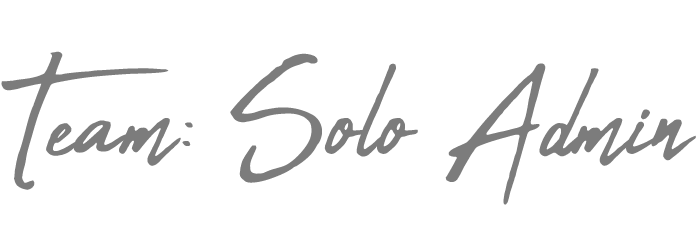It’s not easy to take on the role of an admin. You have to be able to take on the responsibility of a lot of processes, tasks, people, and you need a certain level of professionalism that may not be necessary in other professions. This is not a simple job, but it is one that has many rewards and complexities.
This week and for the entire month of April, in honor of Administrative Professional’s Day on April 27th, 2022, I am going to give you 16 things I wish I knew at various stages of my administrative journey. For those of you just starting out as an admin, you can get the advantage of learning from my experiences. For my seasoned team readers, this might be a fun walk down memory lane!
This week I’ll be discussing what I wish I knew before and when I started as an admin.
Degrees Don’t Matter… Until They Do??
What the hell?
Okay, BACK in my day, you didn’t need a degree to be admin. To be clear, you STILL don’t need to have a degree or get a certification to become an administrative assistant.
It’s not a thing.
However, employers are now asking for admins to have degrees but are not paying for the degree. I, personally, am becoming more and more painfully aware of how companies are trying underhanded tactics to coerce administrative support professionals into doing more work for the same pay.

Sometimes, companies prevent promotions and raises due to lack of a degree regardless of experience and skill set and experience.
This, my friends, is bullshit.
Administrative assistants do not need to get a degree to do our jobs. There isn’t no Bachelor’s or Master’s of Administrative Support out there for us to earn. It’s ridiculous to require a degree in anything for administrative roles.
Last, a degree should never overshadow years of experience, especially if it’s all within the same company. It’s unfortunate there are some organizations now that not give an experienced admin a way to progress within a company simply over a piece of paper that won’t even have anything to do with administrative support even if they got one.
No One Expects You To be Anything Else or More
At first glance, this realization sounds fitting, but the reality is much more discouraging.
There’s something to be said for first impressions. It’s so powerful that we should keep it in our minds in everything we do. First impressions, combined with people’s tendency to be resistant to change, can make it harder to “see” you in any other way.
When I first started in an admin role, a lot of colleagues would ask, “So, are you in school?” At first, I’d say yes. I felt compelled to prove my status by letting people know that my administrative role wasn’t “all” I wanted to be. I thought I had to show my worth by saying that I was learning to be something “greater.”
After a while, I got a little resentful. So when people asked, “So, are you in school?” I would respond with, “What makes you ask that?”
To be honest, the results varied from “Well, you’re young. Is this what you want to do?” to “I can’t imagine you’d want to do this your whole life.”

I’d get irritated, not just with them, but with myself. I completely understood why they were asking me, and mostly because I was right there with them at first.
That perception is strong and can permeate throughout the various levels of an organization. Sometimes, it could cause you being denied for a promotion or opportunity simply because people cannot “see” you as any other role.
It’s easier to assume that an admin doesn’t have the qualifications compared to someone with no work experience but has a degree. Even if an admin worked within an organization for years and actually did that work, some companies choose to hire new people rather than promote from within.
Learn Rules of Etiquette

Etiquette has been my saving grace on many occasions. Etiquette gave me the option to present myself in the way I want to be perceived, regardless of my environment. Understanding and recognizing social cues can be critical to reading a room or person.
Etiquette is a set of social rules that are used to define the appropriate behavior in different situations.
It is a diverse field with many rules, but I will break down into my three main areas: email, social/business/, and dining.
Before I get into those areas, I wanted to offer some general etiquette rules.
General Etiquette:
1) Introduce yourself
2) Be on time/ End on time
3) Dress appropriately
4) Maintain eye contact
5) Use good manners
6) Follow up on conversations and meetings with an email or phone call.
There are three main areas of etiquette you should become familiar with.
- Social/business
- Dining
We rely on emails most of all, so being a master of writing a clear, concise, and polite email can really make a difference every day with everyone you interact with.
Understanding how and when to communicate with people regularly can help you easily set, manage, and maintain expectations, which can help you do your job better and more efficiently.
For social/business and dining, this is more to help ensure you’re putting your best foot forward at all times. If you’re in charge of putting together events or meeting with food, understanding how a table should be set and the names of dining services are imperative to grasp the mood of the event.
No Admin Job is Exactly the Same

When I first started in administrative support, I assumed all admin job were alike. Everyone thinks about the role in the same way, and all admins did the same thing.
Boy was I was wrong!
I wish I knew that admin jobs are all different simply because you will work with different people on your journey. Our profession is client-based (manager, colleagues, etc.), so if the client is different, so must be our jobs.
Other factors that make each admin job different are:
- technology used
- work environment/culture
- industry we support
- job responsibilities
- managers/bosses
- colleagues
- clients
Because so many aspects can be different, I learned just how opened minded and flexible admins have to be just to stay afloat.
Full disclosure, I believe I also relied on Hollywood’s perception of a secretary (a thought that now horrifies me to my core) when I first started. It was only the experience of being in so many unique positions that I realized this concept.
TL; DR (Too long didn’t read)
I wish I knew:
- degrees shouldn’t affect our professional growth, but does depending on the organization.
- people’s assumptions about our profession extend to us and our potential.
- knowing some basic rules of etiquette can help us be more perceptive of other people and control others’ perceptions of us.
- no administrative job is exactly the same. There are many factors that make each job different. Walk in to every position with an open mind and humble flexibility.
Writing this list of what I wish I knew before I became an admin was a lot of therapeutic. It was a lot of fun reminiscing and thinking about my experiences. I’d love to hear from you! What do you wish you knew before you became an admin? Feel free to leave comments!
Featured photo by Delorean Rental on Unsplash


